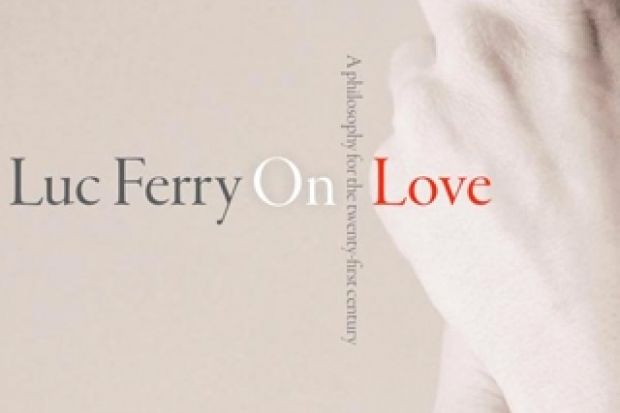Luc Ferry, the French political philosopher and minister of education under Jacques Chirac, here proclaims “the revolution of love” and “the re- enchantment of the world”. This is not a replay of the spirit of ‘68, of which he is critical. Ferry’s project is instead to promote “the dawn of a new era”, the fifth of the “principles of the meaning of life” that have, he claims, successively emerged since Homer. The first (cosmological) “principle of meaning” apparently “appears with the Odyssey”: to live well you had to journey from chaos towards reconciliation with the cosmos. The second (theological) principle, holding sway from Christ’s death until the Renaissance, found harmony in obeying God’s laws. Then came the revolution of subjectivity and “the first humanism”: “a man was in some way ‘saved’…when he laid his own brick in the edifice of human progress”.
Unfashionably, Ferry exalts the greatness of European civilisation and its fostering of autonomy, but admits that his beloved Enlightenment had to be sabotaged by the fourth (deconstructionist) principle. Each “principle” supplies what was neglected and repressed in the preceding one, and the fourth admitted life’s feral undertow, urged freedom and intensity, and liberated women, gays, sexuality, irrationality and the wild. It revealed that the Cartesian subject, supposedly “transparent to itself” and “transforming the world through its imperious will”, is an illusion - really we are in thrall to our unconscious drives interlaced with economic and cultural forces. Also exposed were the Enlightenment’s dark assumptions that anything outside its own notions of historicity and permanent innovation was inferior.
Autonomy in love means we are no longer ready to die for abstractions such as God, country or revolution
Was the deconstruction of “progress”, then, itself a form of progress? Not entirely. Universalism, although often the mask for chauvinist racism, offered a miraculous “anti-determinism”, freeing us from our biological and cultural identities, Ferry argues. Paradoxically, identity politics, which celebrates difference, comes full circle, “clapping us back in the chains of our natural and social particularisms”. Following Nietzsche’s “death of God” came Foucault’s “death of man”, as anti-rationalism dehumanised humanity and bred pessimism.
Now, however, we are on the brink of a second, truly enlightened, humanism. The shift from marriage for convenience to marrying for love (the outcome, Ferry unconvincingly asserts, of a process beginning in the Industrial Revolution) has enabled us to transcend biology and bloodlines (gay marriage being “the endpoint of this history”). Autonomy in love means we are no longer ready to die for abstractions such as God, country or revolution, but only for people “made sacred by love”. Far from entailing a retreat into a private sphere, family love extends fellow feeling from local to global, even from human to ecological. Despite all the “moralizing-ironic-pessimistic pathos” about unprecedented individualism and bankers’ greed, in what golden age did societies provide the dispassionate protection and welfare that Westerners now unthinkingly assume to be essential? Let’s build on that! Ferry ends by recommending a new categorical imperative: “Act in such a way that you can desire to see the decisions you take being applied also to the people you love most.”
He concedes that his programme faces difficulties. Love for our children can be sentimental and excessive, leading to “law and knowledge” being inadequately transmitted, declining educational standards, the cult of child-as-king. Contemporary art is self-important, lacking beauty and innovation, corrupted by the market; bohemianism now incongruously in cahoots with bourgeois capitalism. The economy is in crisis. Ferry, however, can diagnose and prescribe for all three problems. And what about death? Here, he says, “I’m not going to claim to have the solution”. But, of course, he tries.
Steady on, you may think, c’est magnifique but surely ce n’est pas la philosophie; not, at least, if you are used to Anglo-American philosophers wrangling over what we mean by “know” and “ought”. But who cares? Unashamedly broad-brush, often tendentious and contradictory, absurdly grandiose, On Love is thrilling - fireworks of ideas, flashing sabres, and a hell of a good gallop.
On Love: A Philosophy for the Twenty-first Century
By Luc Ferry, translated by Andrew Brown
Polity, 200pp, £16.99
ISBN 9780745670171
Published 12 April 2013
Register to continue
Why register?
- Registration is free and only takes a moment
- Once registered, you can read 3 articles a month
- Sign up for our newsletter
Subscribe
Or subscribe for unlimited access to:
- Unlimited access to news, views, insights & reviews
- Digital editions
- Digital access to THE’s university and college rankings analysis
Already registered or a current subscriber?




